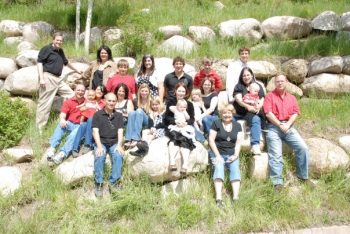Relationships. We live in a fractured society and it seems like that is becoming more and more the case. Families are fractured-single parent homes for instance. Liberals vs conservatives. Red states vs blue states. Politically correct vs incorrect. Everywhere public discourse is becoming less and less civil. Disagreement all over the place. Everybody has their own idea of what they think is important.
like that is becoming more and more the case. Families are fractured-single parent homes for instance. Liberals vs conservatives. Red states vs blue states. Politically correct vs incorrect. Everywhere public discourse is becoming less and less civil. Disagreement all over the place. Everybody has their own idea of what they think is important.
We see this in the very bizarre political season that we are going through. I was talking to a patient, “Fred”, about this and he agreed, but added that he couldn’t believe that none of the candidates were talking about the most important thing.
It seems like they have talked about everything including the economy, ISIS, taxes, guns, immigration, nuclear arms, walls vs bridges, emails and even hand size. I couldn’t imagine what he had in mind so I took the bait.
“Why it’s the Great Pacific Garbage Patch!” Fred replied. “It’s a bunch of trash out in the Pacific Ocean, mostly tiny plastic particles. The fish are eating them and it’s killing the fish and destroying the ocean. Some guy sailing across the Pacific discovered it. It’s huge, about the size of Texas.”
Now don’t get me wrong; I’m all in favor of a clean environment, but I’ve got my doubts about The Great Pacific Garbage Patch. I saw a show on it once, and I was skeptical (no pictures and they couldn’t tell us where it was). Based on the show, I have my doubts; In fact, you could call me the Doubting Thomas of The Great Pacific Garbage Patch. Here are my thoughts:
- I used to live in Texas. Texas is a huge place, hard to miss on your route from New Orleans to LA. Why are there no satellite photos of the garbage patch?
- I’m told the plastic particles are too small to show a change on a satellite map. If that’s the case, then:
- How can a plastic particle be too small to reflect or refract a photon of light? There must be a change of water color or a shadow. Something.
- How can some guy in a boat see a particle that is too small to alter light rays?
- How can fish see these particles enough to eat them?
There are all sorts of planes, boats and satellites crisscrossing the Pacific 24-7. Why did it take some guy in a sailboat to discover something the size of Texas?
- How did the guy in the sailboat know he discovered something the size of Texas? Even when I lived in Texas, I couldn’t look out my window and know I was seeing something the size of Texas (especially when I was surrounded by all those small dust particles in west Texas.)
- Why aren’t all the beaches up and down the West Coast, Alaska, and Japan covered with the stuff?
- Why is there no Great Atlantic Garbage Patch? No offense to my friends and family on the East Coast but I don’t think you’re any cleaner then us Westerners. Are Europeans inherently neater than Pacific Islanders? I guess Hawaii better clean up its act. Maybe we should send some guy from Florida out in a dinghy to discover the Great Atlantic Patch.
- Again, it’s the size of TEXAS, for Pete’s sake. We aren’t talking about Yeti here. There should be pictures all over the news and internet.
- Yes, I am a doubting Thomas and we live in modern times. I WANT PICTURES. Don’t you think that if the original doubting Thomas had modern technology, then he would have taken a selfie with Jesus? If not Thomas, then certainly one of the twelve would have. Why didn’t the guy in the sailboat think of that? And if not him, then what about the thousands of other people crossing the Pacific every day?
All joking aside, I do know that there is trash in the ocean, and that fish will eat it, and that we should teach people to quit being such slobs. Regardless of whether Fred is right or wrong on the size of the garbage, I did start to think that maybe our politicians are neglecting to discuss a major issue. That issue is our relationships with one another. 
Last century, scientists discovered a phenomenon that they call the Roseto effect.1,2 Roseto is a small town in Pennsylvania that at one time consisted of a close knit migrant community from Italy. They discovered that the town had almost no heart disease compared to other American communities. They could not attribute the improved health to lifestyle as the people of Roseto smoked and drank heavily and ate fatty foods, not the Mediterranean that you might expect.
Scientists attributed the improved health to a strong support system and close family ties. There was often three generations living in a household. There was little stress in the community and almost no crime. Faith was emphasized in the family, and parental support and guidance was solid. You can bet that attachment to family and ethics/morals were taught. I’ll bet they even taught the kids not to throw trash in the ocean.
Genetics was not the answer as when people moved out of the community, the health benefits went away. Improved family and community health improved personal health as well.
Yes, a close knit family and supportive community is an essential ingredient to good overall health. Consider this:
We arguably have the best medical facilities here in the US, and yet our life expectancy lags Japan and about 30 other countries by up to 5 years. I’m sure there are many factors for this, but a big part is probably our fractured families and social communities.
When I was growing up, half a century ago, divorce and out of wedlock childbirth was ostracized. While it’s great that we no longer look down upon single moms, we should be doing more to build up intact families. Possibilities include:
- Teaching kids to respect their body as well as that of others (including thinking about their partner and the potential unborn). To be effective, this probably requires teaching and enrichment on all levels- family, community, and church- this would mean attending church on a regular basis-if not for your own good, then for the good of your child.
- Programs such as Marriage Encounter (see www.wwme.org ). This is where couples spend a weekend working on communication and strengthening their marriage.
- Community Marriage Policies (see www.communitymarriagepolicies.org ). These are policies where clergy hold premarital counselling classes as well as enriching and restoring existing marriages.
- Public policies such as having unmarried dads pay child support.
- Having community leaders voice support for such values. This would include clergy, business leaders, journalists, singers/entertainers, sports figures, and even politicians. Hey, is it so wrong to advocate personal responsibility (let’s include not throwing your trash in the ocean here too)?
On a personal note, I have seen many patients live well into their 90’s and even 100’s. Almost invariably they will a strong, supportive family being there for them.
Let’s work on it. We’ll not only be healthier, but we’ll be happier too.
Next time we’ll continue to look at the benefits of relationships on our health.
- Dr. Mimi Guarneri, The Science of Natural Healing, The Great Courses, The Teaching Company Lecture 18, 2012.
- Egolf, B., The Roseto Effect: A 50 year Comparison of Mortality Rates, Am J of Public Health, 1992, August 82(8): 1089-1092.